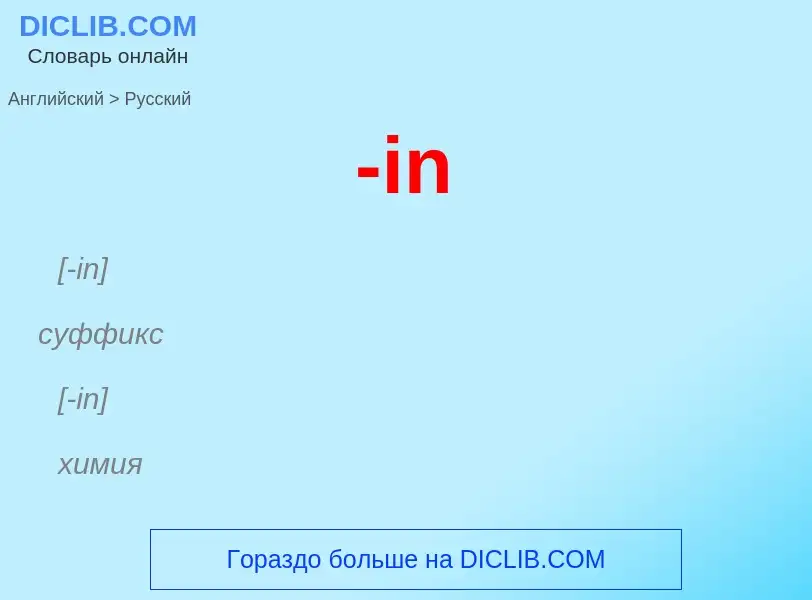Vertaling en analyse van woorden door kunstmatige intelligentie
Op deze pagina kunt u een gedetailleerde analyse krijgen van een woord of zin, geproduceerd met behulp van de beste kunstmatige intelligentietechnologie tot nu toe:
- hoe het woord wordt gebruikt
- gebruiksfrequentie
- het wordt vaker gebruikt in mondelinge of schriftelijke toespraken
- opties voor woordvertaling
- Gebruiksvoorbeelden (meerdere zinnen met vertaling)
- etymologie
-in - vertaling naar Engels
[-in]
суффикс
[-in]
химия
образует названия веществ (в частности многих природных соединений, лекарств, соединений природного характера)
в сложных словах имеет значение действие
совершаемое для привлечения внимания общественности
публики
образует названия веществ: нейтральных химических соединений (insulin-инсулин), энзимов (pancreatin-панкреатин), антибиотиков (penicillin-пенициллин), лекарств (niacin-ниацин)
[-(a)in]
суффикс
[-i:n]
общая лексика
встречается в прил. (преимущественно [лат.] происхождения)
выделяется в сущ., обозначающих женщин
химия
образует названия веществ, в частности галогенов, соединений основного характера, смеси соединений, гидридов и т. д.
Definitie
Wikipedia
-ine is a suffix used in chemistry to denote two kinds of substance. The first is a chemically basic and alkaloidal substance. It was proposed by Joseph Louis Gay-Lussac in an editorial accompanying a paper by Friedrich Sertürner describing the isolation of the alkaloid "morphium", which was subsequently renamed to "morphine". Examples include quinine, morphine and guanidine. The second usage is to denote a hydrocarbon of the second degree of unsaturation. Examples include hexine and heptine. With simple hydrocarbons, this usage is identical to the IUPAC suffix -yne.
In common and literary adjectives (e.g. asinine, canine, feline, ursine), the suffix is usually pronounced or in some words alternatively . For demonyms (e.g. Levantine, Byzantine, Argentine) it is usually or . But in chemistry, it is usually pronounced or depending on the word it appears in and the accent of the speaker. In a few words (for example, quinine, iodine and strychnine), the sound is normal in some accents. Gasoline ends with ; glycerine more often with than with . In caffeine, the suffix has merged with the e in the root, for stressed ; in gasoline and margarine as well the suffix is stressed by some people.
Some elements of the periodic table (namely the halogens, in the Group 17) have this suffix: fluorine (F), chlorine (Cl), bromine (Br), iodine (I) and astatine (At), ending which was continued in the artificially created tennessine (Ts).
The suffix -in () is etymologically related and overlaps in usage with -ine. Many proteins and lipids have names ending with -in: for example, the enzymes pepsin and trypsin, the hormones insulin and gastrin, and the lipids stearin (stearine) and olein.

